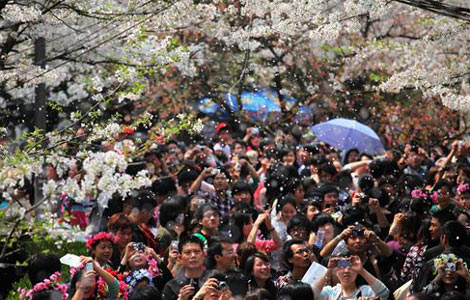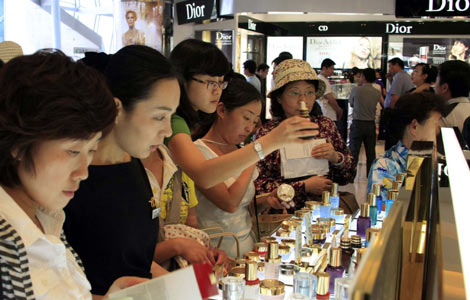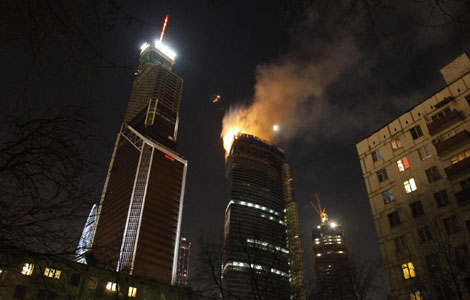 |
|
|
|
|||||||||||
BEIJING - "My son came home from kindergarten today and asked me to call him 'Daddy,'" wrote Cai Zhaohui, on his sina.com microblog.
For other parents this may come across as a humorous schoolboy slip-up, but as the father of an autistic son, Cai knows that this is another example of the many problems his son has with social recognition.
Cai Zhaohui is father to four-year-old Xihe. In between microblogging and writing a book describing the daily life of his autistic son, he is Xihe's full-time carer. Monday afternoon was spent preparing for the next day's journey to the Yilin Autism Rehabilitation Center in Qingdao, a coastal city in east China's Shandong Province.
"I have to give up everything to stay with him," Cai told Xinhua in a soft voice so as to avoid waking his sleeping son. "I came here the day before yesterday, and after queuing for a very long time, he's been admitted to this center." Cai gave this interview to Xinhua to mark the 5th World Autism Awareness Day.
"I've suffered greatly as a result of his autism," said the 39-year-old father, who was once a fashion magazine editor, a talk show host and now a television screenwriter. "But as you can see, I'm an optimistic person. I know he is going to get better. I really want him to go a normal kindergarten in a year or two."
Both his microblog and his book are titled "Daddy loves Xihe," and both have moved tens of thousands of people. Readers are quick to praise the touching stories, and say that Cai is good at mocking himself, and able to turn painful experiences into uplifting prose full of love and warmth.
"He asked me to call him 'Daddy' when it was daytime, although things are very different during the night," he wrote on his microblog in Beijing, right before his journey to Qingdao.
"I was writing in my room when I heard him laughing as he woke from his dream. I crept into his room to check what had happened when I heard him cry out 'Daddy!' As I stepped closer, I heard him say 'hello.' The light was off, neither he nor I could see clearly, and I truly didn't know whether or not those words were for me."
Autism, which has been attached an increasing importance throughout the world, is estimated to have an incidence of between one to two percent worldwide.
Autistic children have difficulties communicating and interacting with others, as they often don't recognize or understand others' emotions or feelings, said Yan Feng, editor-in-chief of the Chinese edition of ?popular French science magazine "Science et Vie," and professor at Shanghai Fudan University.
"The latest official report shows that the proportion of autistic children to normal children is 1:88 in the United States, " Yan told Xinhua."However, the actual number of autistic people in China is hard to quantify, despite the recent national census, due to local social stigma."
The environment for autistic children in China is particularly harsh, he added, as this illness remains largely misunderstood by Chinese society.
"Society is not well prepared," Yan continued, "although the situation is improving. I've noticed many discussions starting to emerge on the sina microblog. But there is the fact that few people are aware of autism, and current facilities and teachers are ill-equipped to help these children."
In the United States, efforts are made to integrate autistic children into society, with the help of specially designed courses, and specially trained teachers and medical professionals, according to Professor Yan.
The situation in China, however, is much more different. Many Chinese schools refuse to admit autistic children. Other parents have even threatened to have teachers dismissed if autistic children are allowed to remain in their children's classes.
Yan said the best method of treatment currently available is Applied Behavioral Analysis (ABA) and China only has one ABA-certified therapist. Moreover, the best rehabilitation institution is not in country's capital, but in Qingdao, where Xihe was taken to.
Parents need to become autism experts themselves in order to counterbalance the current imperfections in today's social system, said Yan. He believes that Qingdao's Yilin center is a good example of this, as it was established by Fang Jing, herself a mother of an autistic child.
While children continue to come up against widespread misunderstanding of their condition, scientists are trying to figure out the genetic cause of the disease.
"Autism research is strongly supported by governments in many countries, and this is also true in China," said Qiu Zilong, a researcher at the Institute of Neuroscience in the Chinese Academy of Sciences. Qiu is studying neurobiology mechanisms underlying the pathophysiology of autism spectrum disorders.
"Autism had been found to be related to mutated genes. Evidence shows that the disease is triggered by a series of mutated genes, not one gene alone," said Qiu, whose Shanghai-based group is studying the molecular mechanism by which autism-related genes contribute to brain development using genetic engineered mice.
The Ministry of Science and Technology launched a national plan in February with an investment of more than 30 million yuan (about 4.8 million U.S. dollars), to discover the genetic foundation and the neurobiology mechanisms of autism.
Another project was jointly launched in October 2011 by Autism Speaks, the world's largest autism science and advocacy organization, and the Beijing Genomics Institute, China's largest genome research institution and one of the pioneers in genome sequencing field worldwide. It is hoped that this project will create the world's largest library of sequenced genomes of individuals with autism spectrum disorders.
"The results from the project will greatly help our research, as well as the autism research community as a whole, as deciphering the genetic code of autism is the first solid step toward conquering this complicated disorder," Qiu said.
"Autism has brought great suffering to many families," he added. "We need to find a cure for them. However, at the same time, these genes are also responsible for some of the extraordinary talents and abilities present in certain autistic children which, one might argue, simply makes them different."
Paintings by autistic children surprised Chinese audiences in many art galleries in Beijing, as their paintings differ greatly from those by other children who are taught to obey rules, he said.
"They can learn basic painting techniques but refuse to paint in the way other people like. Instead, they listen only to their own hearts, which is not easy, even for an artist," he said.
His view is echoed by Yan Feng. "Who can define 'normal'? These children are simply different," he said, "but not abnormal."
Xihe's Daddy also pins his hopes on this difference. "Xihe will probably never be a 'normal' person. But I hope he will maintain his specialness, throughout life. I want him to go to primary school, to middle school, to college, and even get married. He will still become a valuable man," he said, "But just in an alternative way."

|

|

|

|

|

|